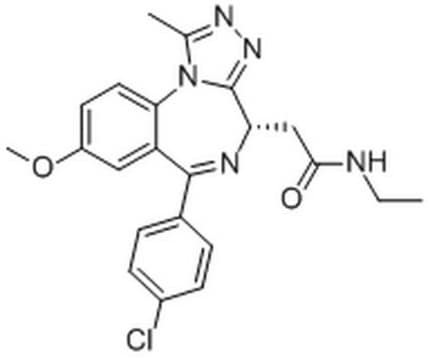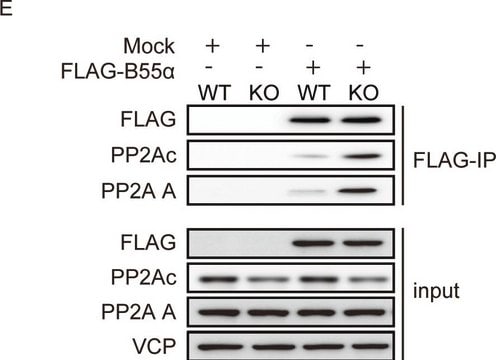401010
I-BET
A cell-permeable benzodiazepine compound that binds the tandem bromodomains of BET (bromodomain and extra terminal domain) family members BRD2 (1-473), BRD3 (1-434), and BRD4 (1-477) with high affinity.
Synonym(s):
I-BET, (2-[(4chlorophenyl)-1-methyl-8-(methyloxy)-4H-[1,2,4]triazolo[4,3-a][1,4]benzodiazepin-4-yl]-N-ethylacetamide, GSK525762A, (S)-2-(6-(4-Chlorophenyl)-8-methoxy-1-methyl-4H-benzo[f][1,2,4]triazolo[4,3-a][1,4]diazepin-4-yl)-N-ethylacetamide, BRD2 Inhi, GSK525762A, (S)-2-(6-(4-Chlorophenyl)-8-methoxy-1-methyl-4H-benzo[f][1,2,4]triazolo[4,3-a][1,4]diazepin-4-yl)-N-ethylacetamide, (2-[(4chlorophenyl)-1-methyl-8-(methyloxy)-4H-[1,2,4]triazolo[4,3-a][1,4]benzodiazepin-4-yl]-N-ethylacetamide, BRD2 Inhibitor I, BRD3 Inhibitor I, BRD4 Inhibitor I
About This Item
Recommended Products
Quality Level
Assay
≥98% (HPLC)
form
solid
manufacturer/tradename
Calbiochem®
storage condition
OK to freeze
protect from light
color
yellow-white
solubility
DMSO: 50 mg/mL
shipped in
ambient
storage temp.
−20°C
SMILES string
Clc1ccc(cc1)C2=N[C@H](c3[n](c(nn3)C)c4c2cc(cc4)OC)CC(=O)NCC
InChI
1S/C22H22ClN5O2/c1-4-24-20(29)12-18-22-27-26-13(2)28(22)19-10-9-16(30-3)11-17(19)21(25-18)14-5-7-15(23)8-6-14/h5-11,18H,4,12H2,1-3H3,(H,24,29)/t18-/m0/s1
InChI key
AAAQFGUYHFJNHI-SFHVURJKSA-N
General description
Packaging
Warning
Reconstitution
Other Notes
Legal Information
Storage Class Code
11 - Combustible Solids
WGK
WGK 3
Flash Point(F)
Not applicable
Flash Point(C)
Not applicable
Certificates of Analysis (COA)
Search for Certificates of Analysis (COA) by entering the products Lot/Batch Number. Lot and Batch Numbers can be found on a product’s label following the words ‘Lot’ or ‘Batch’.
Already Own This Product?
Find documentation for the products that you have recently purchased in the Document Library.
Our team of scientists has experience in all areas of research including Life Science, Material Science, Chemical Synthesis, Chromatography, Analytical and many others.
Contact Technical Service








